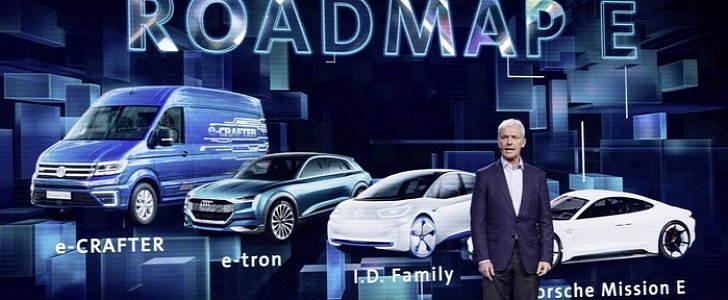Having escaped apparently unscathed from what was perhaps the biggest scandal in the automotive industry in a century, Volkswagen has already made public its plans of turning to electric vehicles into means to ensure future success for the group.
But what seemed at first to be a move meant to keep the people’s car in line with the industry trend is becoming more and more of a long-term business plan.
Speaking at the Volkswagen Group's Annual Media Conference in Berlin, CEO Matthias Müller revealed that probably sooner than later VW is aiming to become the number one electric vehicle producer.
Building on the existing Roadmap E plan to electrify part of the lineup, Müller says that by the end of 2022 no less than 16 facilities the group operates around the world will be manufacturing EVs. That’s a huge leap from the current three locations.
The bulk of the plants, nine, would be added to the EV production roster over the next two years. To ensure a constant flow of batteries for the new cars, Volkswagen has signed an undisclosed number of contracts, valued at 20 billion euro ($25 billion), with battery manufacturers from both Europe and China. North America will soon follow.
Volkswagen says that pushing for electric vehicles does not mean internal combustion units would die. Diesel engines, the target of so much public loathing over the past few years, would remain at the core of the VW lineup.
In 2018, Volkswagen will invest 20 billion euros in developing better diesel and gasoline engines, a sum which would be supplemented by 90 billion euros ($111 billion) over the next five years.
"We are financially robust and strategically well-positioned," Müller said during the conference.
"Things are moving. And we have plans for much more. A change of course for the Volkswagen supertanker - full speed ahead to the future!"
Speaking at the Volkswagen Group's Annual Media Conference in Berlin, CEO Matthias Müller revealed that probably sooner than later VW is aiming to become the number one electric vehicle producer.
Building on the existing Roadmap E plan to electrify part of the lineup, Müller says that by the end of 2022 no less than 16 facilities the group operates around the world will be manufacturing EVs. That’s a huge leap from the current three locations.
The bulk of the plants, nine, would be added to the EV production roster over the next two years. To ensure a constant flow of batteries for the new cars, Volkswagen has signed an undisclosed number of contracts, valued at 20 billion euro ($25 billion), with battery manufacturers from both Europe and China. North America will soon follow.
Volkswagen says that pushing for electric vehicles does not mean internal combustion units would die. Diesel engines, the target of so much public loathing over the past few years, would remain at the core of the VW lineup.
In 2018, Volkswagen will invest 20 billion euros in developing better diesel and gasoline engines, a sum which would be supplemented by 90 billion euros ($111 billion) over the next five years.
"We are financially robust and strategically well-positioned," Müller said during the conference.
"Things are moving. And we have plans for much more. A change of course for the Volkswagen supertanker - full speed ahead to the future!"



















